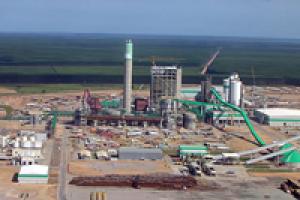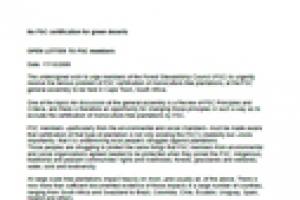On October 27, hundreds of indigenous men and women, fisherfolk and riverine community members occupied the construction site of one of the biggest hydroelectric dam projects in the world, the Belo Monte dam in the state of Pará, Brazil, which will have devastating impacts on the lives of the local population.
Brazil
Other information
7 October 2011
Only available in Portuguese -
Depoimento (audiovisual) de José Luiz Kassupá sobre os impactos do mecanismo REDD na vida dos Povos Indígenas, durante a oficina "Serviços ambientais, fundos verdes e REDD: Salvação da Amazônia ou Armadilha do Capitalismo Verde", 3-7 de outubro em Rio Branco (AC), Brasil. José Luiz é primeiro secretário do movimento indígena no estado de Rondônia.
Other information
7 October 2011
Only available in Portuguese
Depoimento de Sandra Lineia de Caritas Manaus (AM), sobre a relação entre o mecanismo REDD e a migração de populações tradicionais e rurais para as Cidades, durante oficina "Serviços Ambientais, REDD e Fundos Verdes do BNDES: Salvação da Amazonia ou Armadilha do Capitalismo Verde?", em Rio Branco, estado de Acre, entre 3 e 7 de Outubro de 2011
Other information
7 October 2011
We gathered in Rio Branco, in the State of Acre, on 3-7 October 2011 for the workshop “Serviços Ambientais, REDD e Fundos Verdes do BNDES: Salvação da Amazônia ou Armadilha do Capitalismo Verde?” (Environmental Services, REDD and BNDES Green Funds: The Amazon’s Salvation or a Green Capitalism Trap?)
Other information
10 September 2011
Dear friends,
We would like to invite you to support the following action, which is being launched as part of the activities for the International Day Against Monoculture Tree Plantations.
This action is being coordinated by our friends at CEPEDES in Brazil, who have been working for years to support and coordinate resistance to the expansion of monoculture eucalyptus plantations and the pulp mill owned by Veracel Celulose.
Other information
10 September 2011
Brazil, September 2011, various organizations.
Only available in Portuguese -
Read the letter here
Bulletin articles
30 August 2011
In 1999, a number of years before the emergence of REDD, one of the world’s first forest carbon projects was launched. A joint initiative of Brazilian NGO Sociedade de Pesquisa em Vida Selvagem e Educação Ambiental (Society for Wildlife Research and Environmental Education, SPVS) and U.S.-based NGO The Nature Conservancy (TNC), the project is located on the coast of the southern Brazilian state of Paraná, more specifically, in the municipalities of Antonina and Guaraqueçaba.
Bulletin articles
30 July 2011
The region of Brazil, and perhaps the world, where monoculture eucalyptus plantations and pulp production are expanding most rapidly is in the state of Mato Grosso do Sul, and specifically the micro-region of Três Lagoas.
Bulletin articles
5 May 2011
On May 24, environmental activists José Cláudio Ribeiro da Silva and Maria do Espírito Santo, who were husband and wife, were shot and killed near their home in the southeast of the state of Pará, in the Amazon rainforest region of Brazil. As leaders of the National Council of Extractive Workers (CNS), formerly known as the National Council of Rubber Tappers, they fought for the sustainable and diversified use of the forest and against illegal logging and deforestation. Their murders are two more on a long list that seems never-ending…
Bulletin articles
30 April 2011
On April 4, the Inter-American Commission on Human Rights (IACHR), an organ of the Organization of American States (OAS), officially requested that the Brazilian government immediately suspend the authorization and construction of the Belo Monte Dam Complex in the state of Pará.
According to the IACHR, all of the traditional communities who live in the Xingu river basin and would be affected by the construction of the dam must be consulted through a process that is "free, prior, informed, of good faith and culturally appropriate."
Other information
30 April 2011
Brazil: Women in Camp Sister Dorothy Stang – for their right to life, against monoculture eucalyptus
On the evening and early morning of 27 th and 28th February, women of the Landless Rural Workers Movement from all over the Extreme South of Bahia gathered in the area that would become the Camp Sister Dorothy Stang. Many brought their children and looked like they were going to the best party in the world. On 28 th March, round about 4am, before the sun rose on the horizon, hundreds of useless eucalyptus trees were falling on an area planted by Veracel Cellulose, the largest land owner in the state of Bahia. And that’s how they resisted for the next 10 days.
Bulletin articles
30 March 2011
A hydroelectric complex comprising two dams and the diversion of the Xingú River from its natural course on the stretch that flows through the state of Pará; a cost of more than 16 billion dollars; the flooding of 516 square kilometres of Amazon forest; impacts on a total of 1,522 square kilometres of forested lands; between 100 and 142 square kilometres of land left in permanent drought; changes in the river ecosystem, with the introduction of foreign fish species and the extinction of others; loss of biodiversity, which is the source of food and income for millions of people in the Amazon





